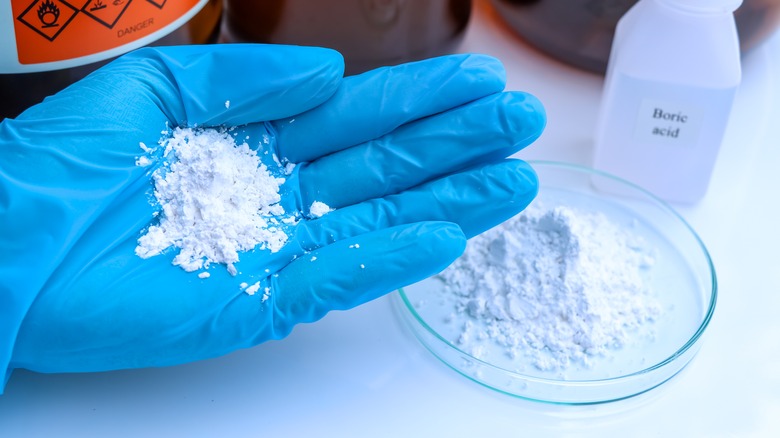Does Boric Acid Treat Bacterial Vaginosis?
Boric acid is a white compound (made up of boron, hydrogen, and oxygen) that is commonly used as a mild antiseptic and insecticide (via Medicine Net). According to many, it might potentially treat bacterial vaginosis (BV). In this condition, the natural balance of bacteria in the vagina is disrupted and replaced by an overgrowth of other bacteria, per the Mayo Clinic. Such a weakened vaginal flora can result from various factors, including improper vaginal hygiene — perfumed soaps, certain ingredients in conventional shower gels, or excessive washing can adversely affect the intimate environment, according to WebMD. Sexual intercourse, especially with frequently changing partners, can also play a role in the imbalance of the vaginal flora, reports the Centers for Disease Control and Prevention (CDC).
The clearest symptom of BV is an unpleasant, fishy-smelling, grey-whitish discharge, per the Mayo Clinic. Vaginal itching and burning sensation in the genital area can also occur. Regarding treatment, various options exist to help manage the condition, and boric acid seems very promising.
Does boric acid treat bacterial vaginosis?
According to a 2020 study published in the journal Poultry Science, boric acid is an antiseptic that has antifungal and antiviral properties. A 2009 study published in the journal Sexually Transmitted Diseases found that 600mg of boric acid, when added to nitroimidazole, was found to be effective in 88% to 92% of participants up to 12 weeks after the first visit.
Despite these findings, it is important to note that boric acid is not the first-line treatment for bacterial vaginosis and should only be used under the guidance of a healthcare provider. In addition, it is important to use boric acid properly to avoid potential side effects. Also, note that boric acid can be toxic when ingested orally, explains Healthline. According to the source, boric acid is available as suppository capsules for treating vaginal infections. However, they should be used as directed by a doctor and should never be used if you are pregnant.
Other methods of treating bacterial vaginosis
Bacterial vaginosis (BV) is typically treated with antibiotics, either topical (applied directly to the vagina) or orally. The most common antibiotics used to treat BV include metronidazole and clindamycin, per the Mayo Clinic. Metronidazole can be taken orally or applied directly to the vagina as a gel or cream. Clindamycin is also available in topical forms.
It is important to follow the instructions provided by your healthcare provider and to complete the full course of antibiotics, even if your symptoms improve before the medication is finished. Failure to complete the full course of antibiotics might lead to the recurrence of BV, reports the clinic.
A 2021 study published in the Journal of the American Academy of PAs (JAAPA) notes alternative treatments such as probiotics, which are live bacteria. It is also important to maintain good hygiene and avoid practices that disrupt the natural balance of bacteria in the vagina, such as douching, per WebMD.



